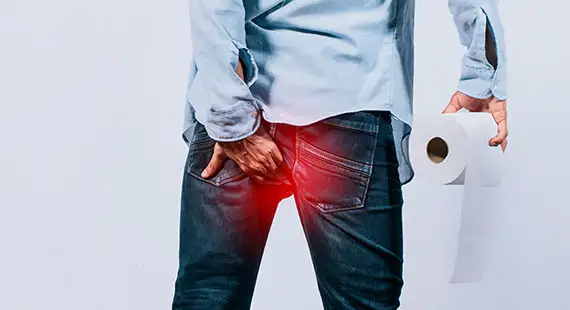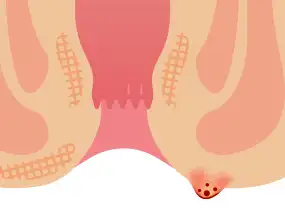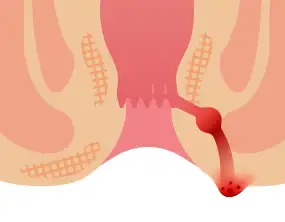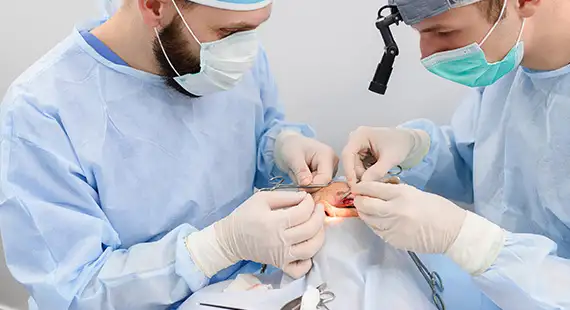Anal Abscess: Causes, Symptoms, Diagnosis & Treatment
An abscess is the accumulation of pus, majorly due to microbial infections. The abscesses can develop in any part of the body because of bacterial infections. There are two kinds of abscesses, ones that develop in the organs of the body and others that develop beneath the skin. Anal abscesses are common anorectal abscesses that are painful and cause swelling of the anal region. Infected anal glands that lead to abscesses are present deep inside the tissues and may not be visible from the outside.

WHAT IS THE ANAL ABSCESS?
An anal abscess is a medical condition wherein pus develops inside the anus due to bacterial infections.
Anus is the last part of the digestive system that is approximately 2 inches long. It has pelvic floor muscles and anal sphincters to allow closing and opening the muscles to pass out stool. when the anus gets clogged, it leads to infection and abscess formation.

TYPES OF ANAL ABSCESS
Perianal abscess
Most common type of anal abscess. It has pus filled lump in perianal region.
1

Ischiorectal abscess
Next common type of anal abscess formed when anal sphincter traverse into deep ischiorectal space.
2

CAUSES
- Infection in the anus or rectum
- Anal obstructions
- Crohn's disease
- Cancer origin
- Trauma
HOW IS IT FORMED?
Anal abscesses are formed when there is blockage or clogging of a gland in the anus after infection by certain bacteria. An abscess may also result from the trapping of stool or poop in the anal glands.
Pelvic floor muscles and anal sphincters play an important role in passage of stools. Anus has various mucus secreting glands that can get clogged or blocked causing abscess and infection.

SYMPTOMS
- Pain and discomfort
- Fever
- Fatigue
- Constipation
- Lower abdomen pain
- Hard or lumpy tissue near the anal region

DIAGNOSIS
- Physical examination of the rectum
- Computed tomography (CT scan)
- MRI (Magnetic Resonance Imaging)
- Anorectal ultrasound
- A lab test to check blood cell count
DO's
DONT's
TREATMENTS
NON-SURGICAL TREATMENTS

Sitz baths- Soaking in warm water a few times a day helps relieve pain and discomfort caused due to swelling or lumps in the anal region.
Laxatives- Laxatives are stool softening medications that help prevent bowel movements.
Antibiotics- Antibiotics are the medications given to the patient in order to prevent infections in the anal region in case the patinet has weak immunity.
SURGICAL TREATMENTS

Anal abscess surgery
The surgical procedure for treating an anal abscess includes the drainage of pus by making an incision near the infected anal region. The procedure is performed by giving local anesthesia to the patient.
The absces contains pus that needs to be drained. In order to do this, the doctor makes a slight incision with sterilized surgical tool and drain the abscess contents. Lastly, the abscess is cleaned to prevent further infections.
RISKS AND COMPLICATIONS
Risk factors
- Smoking
- HIV
- Immunosuppressive drugs
- Diabetes
- Crohn's disease
- Medications like prednisone
Complications
- Sepsis
- Recurrent abscess
- Fistula formation
- Fecal incontinence
- Infections
- Scarring

IF LEFT UNTREATED
If the anal abscess is left untreated, it may lead to serious discomfort in the patients. The anal abscess can also extend from the anal region towards the pelvic diaphragm (called the ischioanal space) and to other perianal regions. It may lead to other systemic infections if not treated on time.
COST
The minimum cost of treating an anal abscess is ₹ 80,000, and the maximum cost is ₹ 95,000. The cost may differ depending on the severity of the condition, hospital services, and city.
Financial Options

INSURANCE COVERAGE
The treatment of an anal abscess is covered under health insurance. Mostly, the insurers cover the treatment costs for abscesses or anorectal abscesses. The insurance policies decide the amount of insurance coverage. There are certain norms and regulations for claiming insurance. The hassle of claiming the insurance is entirely done by Glamyo’s insurance team.

Anal Abscess
An anal abscess occurs when an anal cavity gets filled with pus. It is like a tender lump under the anal skin. It is common in men of ages 20 to 60 years. People with diabetes, HIV/AIDS, STDs, and IBD (Inflammatory Bowel Disease) have a higher risk of getting an abscess.
Reduce your risk of abscess recurrence by following management methods:
- Maintain good hygiene habits especially for genital and anal regions
- Choose protective sex to prevent STIs and bacteria transfer.
- Manage medical conditions that may increase the risk of anal abscesses like IBDs (Inflammatory Bowel Diseases) and diabetes.
There are various health conditions that are difficult to avoid and may increase your risk of anal abscess. It is crucial to discuss with doctor to remain aware of the subsequent complications.
Glamyo Health provides the best proctologists who treat anal and rectal related disorders. In order to tackle with the complicate abscesses, one must consult specialists in a particular field for appropriate guidance.
For hassle free experience in any type of elective or non-invasive surgeries, you can opt Glamyo Health for personalised experience. Get insights of patient reviews who went through smooth and successful surgeries with Glamyo Health.
 New Delhi
New Delhi  Bangalore
Bangalore  Mumbai
Mumbai  Hyderabad
Hyderabad  Pune
Pune  Chennai
Chennai 
